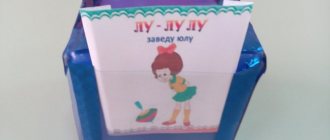Speech and its role in the development of a child; educational and methodological material on the topic
Speech and its role in child development
Mastery of the native language and speech development is one of the most important acquisitions of a child in preschool childhood and is considered in modern preschool education as the general basis for the upbringing and education of children.
Speech, in all its diversity, is a necessary component of communication, during which it is, in fact, formed. The most important prerequisite for improving the speech activity of preschool children is the creation of an emotionally favorable situation that promotes the desire to actively participate in verbal communication. The development of speech is closely related to the formation of the child’s thinking and imagination.
With normal development in children of senior preschool age, independent speech reaches a fairly high level: when communicating with adults and peers, they demonstrate the ability to listen and understand spoken speech, maintain a dialogue, answer questions and ask them independently. The ability to compose simple stories, but interesting in their semantic load and content, to construct phrases grammatically and phonetically correctly, and to compose their content compositionally, contributes to children’s mastery of monologue speech, which is of priority importance for the child’s full preparation and schooling. In preschool age, a child’s vocabulary is constantly increasing, but its qualitative transformation is entirely mediated by the participation of adults.
Speech performs a wide variety of functions in human life - communication, transmission of the experience accumulated by mankind, regulation of behavior and activity. All functions of speech are interconnected: they are formed through each other and function in one another. In order for these functions to appear in a timely manner and be fully implemented, appropriate conditions are necessary. When a child first begins to speak, he often has difficulty using his speech to organize communication. It is simply impossible to convey to him the experience of previous and current generations (in the form of knowledge, skills and abilities) with the help of words, without visual and effective support. As a regulator of the child’s activity, speech also functions very limitedly during this period. In order to fulfill all its functions, speech goes through a complex and long path of development, closely connected with the general mental development of the child - the enrichment of his activity, perception, thinking, imagination, emotional-volitional sphere.
In general, the speech development of a preschooler undergoes the following changes:
1. It is carried out in two directions:
a) social – its practical use is improved in the process of communication with adults and peers;
b) semantic - speech becomes the basis for the qualitative transformation of mental processes and turns into a tool of thinking.
2. There are two stages that naturally replace each other:
a) passive mastery of words, when a child understands speech addressed to him, but does not yet know how to speak;
b) active use of speech.
In order for speech to serve as a means of communication, conditions are necessary that encourage the child to consciously turn to the word, forming the need to be understood first by adults, and then by peers. Such conditions arise, first of all, in the process of communication itself and activities organized by adults together with the child. With the correct organization of a child’s entire life and activity, speech already at an early age becomes the main means of communication. Of course, the baby understands only part of the words and not all grammatical structures, but it is speech that attracts his attention to objects and actions, its emotional tone determines the mood and direction of communication. If there is a lack of communication at an early age, its limitation, poverty, lack of saturation, it will be difficult for a child to learn to communicate with children and other people; he may grow up uncommunicative and withdrawn.
Parents must understand that language is the main subject in education, understand the importance of their own role and responsibility in the development of their child’s language. Familiarizing children with their surroundings and expanding their vocabulary occurs not only in the learning process. Everyday activities (eating, dressing) provide great opportunities for enriching and expanding vocabulary. The work activity of the child and his ability to participate in family life are extremely important for the development of vocabulary. Children understand the meaning of many words; the nature of work communication contributes to the child’s use of acquired words and consolidation of them in memory.
Every new event in the life of a family - a trip to the village to visit grandmother, a visit to the theater, a museum, moving to a new apartment, work in the garden, is a prerequisite for the child to acquire new skills, accumulation and activation of vocabulary for children.
Children with varying degrees of speech underdevelopment have great difficulty mastering the syntax of the language. This manifests itself in incorrect word agreement, errors in case endings of all grammatical categories, and incorrect phrase construction. In this case, parents need to tactfully point out the mistake to the child, without repeating it, and pronounce the option correctly, inviting the child to repeat it.
A very effective means of vocabulary work in the family is a game. An important factor for the development of a child’s speech is the participation of an adult (parents or older family members) in the game.
Children's vocabulary is also enriched in their creative activities, in the process of becoming familiar with art. Watching television programs and movies that are age-appropriate for children greatly expands children’s horizons and makes new words clear to them, thanks to the combination of sound and visual perceptions. Of great importance for the development of children’s speech is a conversation after watching a movie or a play, repetition of new words and expressions unfamiliar to the child.
Communication with peers in preschool age plays no less important role in the development of children than communication with adults. It also arises mainly in joint activities.
The first distinctive feature of contacts with peers is their particularly vivid emotional intensity. In communication between preschoolers and children, there are almost ten times more expressive facial expressions and bright expressive intonations than in communication between a child and an adult.
The second feature is the non-standard nature of children’s statements and the absence of strict rules. If an adult gives a child communication standards, teaches him to speak properly, like everyone else, then a peer creates the conditions for independent speech creativity.
The third feature is the predominance of proactive statements over reactive ones. In contacts with other children, it is much more important for a child to speak out himself than to listen to another.
The fourth difference is that communication with peers is much richer in its purpose and functions. By communicating with adults, the baby masters speech norms and learns new words and phrases. However, all these learned words, expressions, and rules may remain in the “passive storeroom” and not be used by the child in everyday life if the child does not need them. For passive, potential knowledge to become active, there must be a vital need for it. When talking to an adult, the child does not make any special effort to be understood. An adult will always understand him, even if the child’s speech is not very clear. Another thing is a peer. He will not try to guess the desires and moods of his friend. You need to tell him clearly and clearly: what you want, what you are not happy with, what you are going to do, what you like to play. And since children really want to communicate, they try to more coherently and clearly express their intentions, thoughts, and desires.
Preschoolers who do not have contact with peers experience significant difficulties in communicating with adults, despite an active desire to talk with them. Thus, for the full development of speech, it is necessary to communicate both with adults and with peers.
References:
1. Belobrykina O.A. Speech and communication. A popular guide for parents and teachers. - Yaroslavl: "Academy of Development", 1998.
2. Kozyreva L.M. Speech development. Children from birth to 5 years. — Yaroslavl: “Academy of Development”, 2001.
Prepared by:
Teacher at MBOU gymnasium No. 9
Boyarova N.A.
Playing and learning to speak: role-playing games for children
Options for playing with a child are limited only by the parents' imagination. At the same time, the child often independently suggests what he wants to do, distributes roles and organizes the game. Your mission is to fill the game with detailed dialogues so that the game is not only exciting, but also useful for the development of the baby’s speech. It can be:
- Hide and seek The classic game of “peek-a-boo” with infants can gradually change. You can hide behind anything, attracting the child with the words “where is mom?”, “find mom.” As the child grows up, he will begin to enjoy hiding on his own, and you, with appropriate verbal accompaniment, will look for him.
- Role-playing games At first, these can be very simple games. For example, you can play with a toy phone, a child can call mom, dad, brother, sister, say “Hello,” find out “how are you?” and vice versa. Then you can role-play fairy tales, come up with stories yourself, using household items and toys
mother plays with daughter
- “Guess” There are many variations of games. You can ask your child: “guess what I’m doing?” and show some action: combing your hair, pouring tea into cups. Or ask: “guess who I am?” and depict a bunny or a bear cub. You can show soft animals and ask: “guess who it is?”, “what does he like to eat”, “where does he live?” If the child cannot answer, you should give a detailed answer yourself, and after a while repeat the questions to the child
- Active games Nursery rhymes and songs can be used in active play with the child, encouraging him to repeat the corresponding actions along with the words. This, in parallel with speech skills, will develop both the child’s physical and musical abilities. Examples:
nursery rhyme with movements 1
nursery rhyme with movements 2
Working on correct pronunciation: exercises, articulation gymnastics in pictures
In order for your child to quickly master the correct pronunciation of words, and you do not have to contact a speech therapist, there is so-called articulation gymnastics. Regular exercises with a child who constantly confuses and mispronounces sounds will lay the foundation for correct and beautiful speech in the future. It is better to train the muscles of the tongue, palate, lips, larynx and cheeks in front of a mirror.
Examples of exercises:
articulation gymnastics 1
articulation gymnastics 2
articulation gymnastics 3
You can dilute the activities by including funny rhymes, movements and grimaces. For example:
rhyme for articulation 1
rhyme for articulation 2
rhyme for articulation 3






